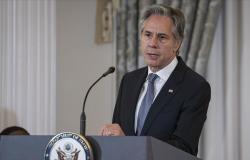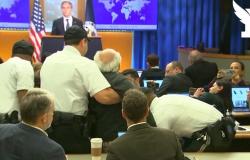Tuesday January 7. Donald Trump is in a terrible mood. At a press conference at Mar-a-Lago, his Florida home, he promised that “all hell will break out in the Middle East” if the Israeli hostages are not released on the day of his inauguration. For him, it’s almost an obsession. We can legitimately wonder about the nature of the additional hell in Gaza that could decide Hamas to release its hostages. A little over a year after the start of the Israeli intervention, the place is nothing more than a field of ruins and the death toll exceeds 40,000. So, really, another carpet bombing could- will it change the situation?
Hard to believe. But, in diplomacy, words are often more important than actions. Donald Trump knows that, since his election, he has had an advantage over all the players on site. At the dawn of his presidency, even the United States’ worst enemies like Iran are ready to make concessions. Tehran has also postponed strikes on Israel in response to those of last October on its territory to “give peace a chance”. Its new president, Masoud Pezeshkian, has just declared that he is ready to meet Donald Trump.
The president’s men have been on war footing for several months to secure this release for inauguration day. The objective is clearly to repeat what Ronald Reagan did in his time to Jimmy Carter. On January 20, 1981, the American hostages held in Iran were released minutes after the new president was sworn in, immediately granting him the status of peacemaker and savior of America. For history, Jimmy Carter will remain the weak, the unloved. Having died on December 29, his funeral will once again be the occasion for a demonstration of complicity and frank laughter between Donald Trump and Barack Obama which will make Kamala Harris, Hillary Clinton and the entire Democratic camp uncomfortable.
On the ground, in the Middle East, the president-elect’s special envoy, Steve Witkoff, is in charge. In his own style, Donald Trump chose this New York real estate mogul to seek an agreement between Israel and Hamas. We are closer to“art du deal”named after Donald Trump’s book, that“Complicated East” dear to General de Gaulle. But the emergence of such an individual will have had the merit of breaking the codes in a negotiation that a veteran of diplomacy like Antony Blinken will not have succeeded in bringing to a conclusion, after ten trips to the region since on October 7.
In this matter, Donald Trump masters the newcomer card wonderfully, even if, in all honesty, a good part of the job was done by Antony Blinken and, to a lesser extent, by Joe Biden.
The rest after this ad
-It’s hard to say “no” to Trump
On the Hamas side, the agreement includes the release of some 33 hostages still alive in exchange for some 1,300 Palestinian prisoners, including all those sentenced to life imprisonment, as well as a ceasefire with the withdrawal of the IDF from the the entire Gaza Strip, including the Philadelphia and Netzarim corridor. Even if the objective of the ceasefire is to lead to the creation of a Palestinian state linking, with its two components, Gaza and the West Bank, the terrorist organization therefore implicitly retains control of the territory. It thus escapes the eradication promised by Benjamin Netanyahu. “As long as the fighters are still standing, we have not lost the war”wrote Hamas leader Yahya Sinouar last June in a letter intercepted by Israeli intelligence. Sinouar has since been eliminated, but others have taken over, including his brother Mohammed, a fanatic who is now in command of the terrorist organization. As such, Antony Blinken himself acknowledged that Hamas has, to date, recruited almost as many new fighters as those it lost in the fighting. It is obvious, even if it is too early to see the effect, that Hamas will not lose its hold on Gaza, which will complicate the establishment of a Palestinian state acceptable to the international community.
The lone rider of a Netanyahu without limits seems to be over
On the Israeli side, Trump’s “deal” complicates any new IDF intervention in Gaza by depriving the army of a presence in the enclave. For the Netanyahu government, it is a question of showing that it is capable of concessions and that it also admits the opening of a new era with Trump. The religious right, a stakeholder in Benjamin Netanyahu’s coalition government, felt this. She is strongly opposed to the agreement. The Minister of Internal Security Itamar Ben Gvir calls on his ally, the Minister of Finance Bezalel Smotrich, to refuse the agreement and threatens to resign. He describes it as ” dangerous “. But it’s not that simple. Because even the most hawkish of the Israeli Prime Minister’s allies cannot see in Donald Trump’s proposal a weakening of American support for Israel. It was in fact Donald Trump who, during his previous mandate, chose to install the American embassy in Jerusalem instead of Tel Aviv. It was also he who, thanks to the Abraham Accords, allowed the establishment of diplomatic relations with Bahrain, the United Arab Emirates and Morocco. Donald Trump appears to be Israel’s best friend. It’s hard to say no to him.
The lone rider of a Netanyahu unlimitedly attacking his enemies, Hamas, Hezbollah, Iran, Houthis, and bombing Gaza in the face of an overwhelmed or senile Joe Biden now seems to be over. Proof of this is an anecdote delivered by the daily Haaretz and which directly concerns Trump’s special envoy, Steve Witkoff. Friday January 10, after having reached the beginning of an agreement in Qatar, Witkoff called Benjamin Netanyahu’s office to announce his arrival the next day in Israel. “Due to Shabbat, the Prime Minister will only be able to receive you in the evening”he was told. Steve Witkoff then explains in rather crude words that this does not concern him. And the next day, “Bibi” is there in the morning to welcome him.





